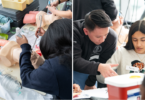Have you got a sniffle, a runny nose, or a lingering cough you can’t seem to get rid of? It may not be your typical summer cold; it could be COVID-19.
Canada is seeing what experts call a ‘summer surge.’ Although COVID-19 and other respiratory illnesses are often associated with colder months, COVID-19 cases have risen in recent weeks due to decreasing immunity among the general public.
Wastewater surveillance from the Public Health Agency of Canada suggests rising cases across the country. The current viral activity level for COVID-19 in Canada is deemed ‘moderate,’ with cases highest in Toronto, Winnipeg, Vancouver and large parts of Nova Scotia.
“This summer, we have seen some severe cases of COVID-19 among older adults and those with compromised immune systems”, says Dr. Jerome Leis, medical director of Infection Prevention and Control at Sunnybrook. “This is similar to past summers, but one difference is that these severe cases are occurring in higher frequency among individuals who may have been vaccinated at the beginning of the pandemic but have not kept up with seasonal COVID vaccines.”
What is behind the surge in cases?
The increase in COVID-19 cases is mainly due to decreasing immunity in the general population. While most cases remain non-severe, an increase in hospitalizations may be related to gradual loss of immunity against newer strains of COVID-19 and the need for updated seasonal vaccine to increase protection.
How do summer activities impact COVID-19 cases?
Like some other respiratory illnesses, COVID-19 circulates year-round. Cases of COVID-19 are heightened by common summer activities like increased social gatherings, travel, and spending more time inside during extreme heat events. All of these situations have the potential to spread COVID-19 to those with decreased immunity.
What can you do to protect yourself and others against COVID-19?
Getting the updated COVID-19 vaccine his fall is the best way to increase protection throughout the year. While it’s too late to get the vaccine to combat the summer surge, this year’s updated COVID-19 vaccine should be available by early fall. Masks can also be worn to prevent transmission to high-risk individuals.
What should you do if you suspect you may have COVID-19?
If you have cold symptoms or think you may have COVID-19, you should avoid gatherings where you can spread germs to those who may have more severe outcomes from COVID, until you are fully recovered.
By following public health guidelines and staying up to date with COVID-19 vaccinations, we can all do our part to stay protected.








